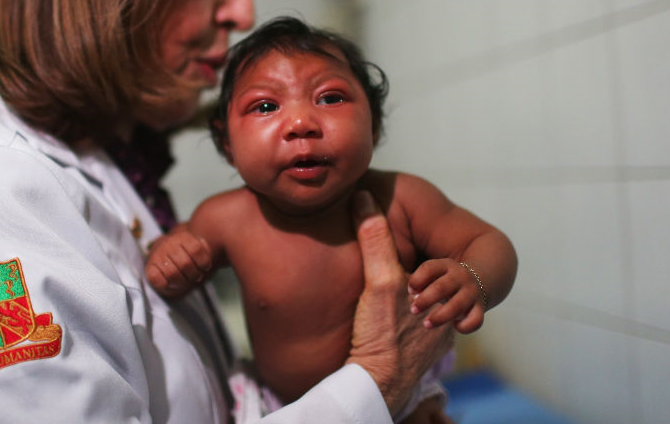A new Centers for Disease Control report on Thursday gave a picture of the first effects of the Zika virus on babies in the United States.
The CDC said three babies have been born in the U.S. with birth defects linked to the Zika virus, while three more were either miscarried or aborted, according to The Hill.
The virus has been linked to birth defects in newborns, one being microcephaly. The brain disorder is not typically fatal, but it can cause health problems throughout the child’s life. Abortion advocates have been using the link between the virus and microcephaly as an excuse to push for more abortions on babies with disabilities.
Here is more from the report:
The CDC is following the first case of a baby born with Zika-caused birth defects last month in New Jersey.
The Associated Press reported that in all of the cases, the mothers contracted Zika abroad. There has not yet been a case of someone contracting Zika in the continental United States, although that is expected to begin this summer.
The CDC said the birth defects include microcephaly, which is when a baby is born with a head that is too small, causing developmental problems as well as other brain defects.
“What we are reporting is moms who had laboratory evidence of Zika virus infection and the baby had birth defects consistent with Zika virus infection,” Dr. Denise Jamieson of the CDC told NBC News. “Some, but not all, of the infants have had evidence of Zika virus infection.”
Click here to sign up for pro-life news alerts from LifeNews.com
Jamieson told the Associated Press that other babies linked to Zika have been born with no immediate signs of problems, but she would not say how many.
“Researchers estimate that for every 100 pregnancies involving women infected [with Zika] early in their pregnancy, 1 percent to 15 percent will develop severe birth defects,” according to the AP.
Last month, the CDC reported knowing of at least 300 pregnant women in the U.S. who are infected with the virus. Zika, which is carried by mosquitoes, already is a major problem in South and Central American countries, and experts predict that southern states in the U.S. will begin seeing cases this summer.
Congress currently is debating funding bills that would provide aid for Zika prevention and research for a vaccine. The U.S. House passed a funding bill in May; however a group of Democrats opposed the bill because it did not promote or fund abortions, LifeNews reported.
Abortions are being pushed on women who contract the virus, despite problems with diagnosing Zika and microcephaly. Health authorities say people who are infected with Zika do not necessarily show symptoms of the virus; and when they do, their symptoms can look like other illnesses. Similarly, conditions like microcephaly often are not diagnosed until unborn babies are at least 20 weeks along in the womb.
This means women who have or think they have Zika could be pressured to have early abortions without knowing whether their baby really has the disorder. If the moms wait until they are more certain of their baby’s diagnosis, they could be pressured to have a dangerous, late-term abortion when their unborn babies are viable outside the womb. Both situations are troubling.
No matter whether an unborn baby is healthy or sick, the baby deserves to live. The fact that abortion activists believe people with disabilities like microcephaly should be targeted for abortion is concerning to many disability rights advocates, even some who support abortion.
At least one U.S. mom has said yes to having her baby, despite being infected with Zika, LifeNews reported in May. Connecticut teen Sara Mujica believes her unborn baby’s life is a miracle.
The young mother said she plans to give birth to her baby no matter what. When Mujica was 15, she had meningitis, and doctors told her that she would never be able to get pregnant, she said.
“… so this is a big miracle for me,” she said of her unborn child.
The new CDC report did not indicate whether Mujica was one of the three women whose babies were born with birth defects.
Families who have experiences with microcephaly also are countering abortion activists’ fear mongering, saying that women should be offered education about the condition and support – not abortion.
Kansas mother Gwen Hartley, who has two daughters with microcephaly, said she initially struggled when she learned about her daughters’ diagnosis, but today she believes they are a huge blessing to her family.
She encouraged mothers not to throw away their unborn babies’ lives because they are afraid.
“In the beginning, I was crushed,” Hartley said. “… But if you open your mind enough, you realize your whole life is in preparation for this moment, and this moment will make you better.”








